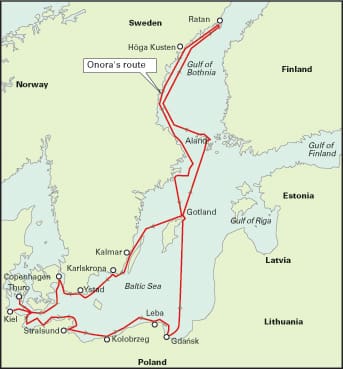The Baltic is not the deepest of seas, but we never expected to have problems entering a harbor with entrance breakwaters like Leba, Poland. What happened when we started to enter the harbor foreshadowed what was to come, but neither myself nor my wife Jeannie grasped its significance. We were sailing our 63-foot, Chuck Paine-designed aluminum sloop Onora, built in New Zealand by Kelly Archer. Onora already had carried us to both the Arctic and the Antarctic. From a distance she has the fine lines of a yacht, but up close she is all business with gray metal unpainted top sides, nonskid decks, and a massive rig.
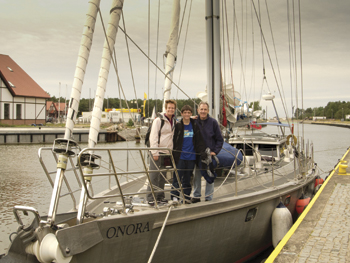 |
|
Jean and Jim Foley and their grandson, Ian Fitch, on the foredeck of Onora, the Foley’s 63-foot aluminum sloop. |
The approach to the harbor at Leba gave no us warning of anything but a navigable channel. Except for a lone red ball inshore off the eastern breakwater, however, there were no red and green buoys to mark a deep water fairway. As we approached the breakwaters, a slight bump surprised me. Our C-Map chart on the screen said we were in 13 feet of water, but it felt like our keel — we draw eight and a half feet — touched the sandy bottom. I did not bother to look at our depth reading because our B&G instruments were dead thanks to a lightning strike two days earlier.
We passed between the welcoming arms of the jetties and into the calm of the sheltered port. Jeannie was busy showing Ian, our teenage grandson on his first cruise, how to prepare lines and fenders. A bump against the bottom that would normally set off Jeannie’s radar passed without comment. I put this clear warning out of my head and focused on the channel in front of me. I called the marina manager on our VHF radio and he responded. He spoke enough English to direct me to a wall a quarter of a mile up the river. When we reached the spot our keel plowed through the soft mud and we came to a stop just inside the marina entrance wall. Jeannie jumped off and Ian handed her the lines to run around the cleats.
There was a collective sigh of relief that no one had shot at us during our recent passage. It turned out that NATO war games called Baltic Operations (Baltops) 2011 were on while we were in the area. We had to leave our last port at midnight in order to cross the firing range during the 0300 to 0600 cease fire. The Russians could not ignore these NATO maneuvers and had announced their own naval exercises, set to take place near the Polish border just to the east of us. This effectively blocked our plan to sail to Lithuania.
Our Baltic cruise had started a year earlier when we had crossed the North Sea and passed through the Skagerrak between Norway and Denmark. We continued east to Latvia, Estonia and St. Petersburg where we turned back to the west to southern Finland and Sweden. The Baltic’s grand capitals, its medieval ports and the solitude of its rock and pine skerries seduced us. In the fall, I raised the option of a second Baltic summer. Jeannie immediately agreed. We left Onora at Walsteds boatyard in Denmark and returned home to Chicago for the winter.
We had spent this past June exploring northern Germany and were now approaching eastern Poland. The highlights were visiting the necklace of gem-like cities of the 14th century Hanseatic League that ring the Baltic. Their thick city walls and cobblestone streets lined with inns, stone warehouses, shops and merchant mansions have been frozen in time for 800 years.
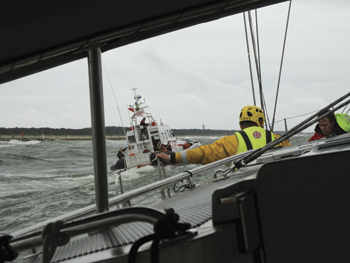 |
|
Needing assistance when departing Leba, a Polish Coast Guardsman came aboard to assist in handling the towline. |
Now we were in Leba, and we were looking forward to the next day’s sail to Gdańsk, formerly Danzig, and one of the grandest of the Hanse era. After several days of exploring Gdańsk, Ian would catch his Lufthansa flight and we would head north to Sweden’s Höga Kusten, a World Heritage site in the Gulf of Bothnia between northern Sweden and Finland.
The coast of Poland reminded me of southern Lake Michigan. There is as little tide and the water is almost salt free. The shore is one long sandy beach indented by breakwaters extended from dredged river mouths to form harbors.
Leba
Jeannie opened the refrigerator to look for breakfast eggs while I left in search of the marina office. I found three men in their 40s drinking coffee and watching TV news in a smoky room. The one who spoke English took my harbor dues and gave directions to town.
“The chief amusements are the shops, the beach and Jurassic Park.” He handed me a flier for the park. It had pictures of scary, huge dinosaurs and boasted a 5D (!) cinema.
The morning was still cool and overcast when we finished the breakfast dishes and covered the main. We stepped onto solid ground to explore our new town, which was on the other side of the channel and so we walked up the road to cross the bridge. Ian lit up when, among the mix of shops selling beach toys, ice cream, and waffles, he found a rack with glow-in-the-dark tee shirts for his brother and sisters. It was run by the only other English speakers we would find. This couple spent their winters in Florida visiting flea markets where they loaded up on the souvenirs that Ian bought to carry home.
Grounding
After a sound sleep I was up on deck to look at the weather conditions for our sail to Gdańsk while Jeannie made pancakes and Ian enjoyed his teenage sleep. It was still gray but the clouds were high and not threatening. The wind swayed the top branches of the forest that sheltered us. The wind was 20 knots from the west, promising a fast downwind run under poles on our passage to Gdańsk. I radioed the harbor master and received permission to leave.
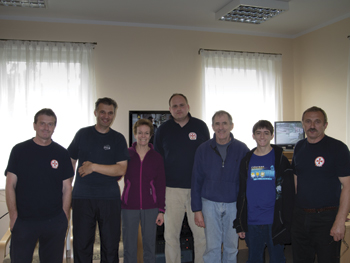 |
|
The Foleys with their Polish Search and Rescue team friends. |
After breakfast, the books, dishes and the usual suspects were stowed; the sail cover came off; and, the running backs were set. I started the engine while Ian and Jeannie handled the fenders and lines. I put the shift into reverse and we slid back out of the mud and into the main channel. It was quiet. No traffic and two holiday makers bundled for the bluster promenading on the town side. I put the shift in forward and we started toward the sea.
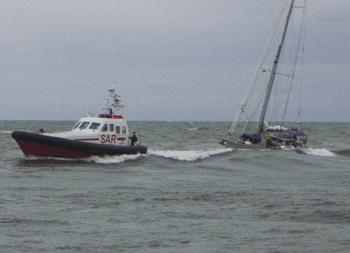 |
|
Onora under tow from the SAR vessel Huragan. |
In the distance, I could see spray flying over the western breakwater and now guessed it was blowing 25 knots. We had left places in worse weather. If we had waited for it to calm down in Port Stanley in the Falklands, we would still be waiting.
The west breakwater at Leba extends beyond the east breakwater, curving like a sickle. I slowly followed its turn along the sea wall that sheltered us from the waves. As we slid past, I waved at a cigarette-smoking crewmember of a dredger tied just inside the end of the east jetty to starboard. The red ball buoy was well to landward of us. The water was open on our northeast track.
As soon as we left the sheltered mouth, a wave lifted us. When the swell passed, all of Onora’s 35 tons slammed down onto the bottom. The wheel spun out of my hands and the next wave knocked us sidewise, shoving us toward the beach.
I grabbed the wheel and gunned the engine. With the next wave I spun our bow back to face the oncoming waves. My mind raced. If we could just move forward a few feet we might get off. I pushed the throttle to full power. The next swell lifted us and we moved forward but then slammed down. This one landed a heavy punch to Onora’s starboard side, knocking her head to port. We were rising and slamming and getting knocked from side to side. Onora would not be pushed back but could not claw forward.
The rudder was also hammering the bottom. With each hit the wheel would rip from my grip, mashing my thumbs with its metal spokes. I grit my teeth and grabbed again, determined to keep our beam from being exposed to the surf. As long as the bow pointed into the waves we would make headway each time we were lifted. At worst it was a rear guard action keeping us off the beach until the cavalry arrived.
Jeannie was at the mast and pulled herself across the 30 feet of bouncing deck and into the pilothouse. She grabbed for the radio and yelled for help.
In a frantic voice she called, “Mayday, mayday, mayday, this is Onora at Leba, help, help, help.” In what I considered to be a calm voice I yelled, “Correct that to ‘Pan, Pan, Pan, Onora, Onora, Onora at Leba, Leba, Leba — three persons aboard — no injuries — aground, aground, aground; requesting assistance.’”
Jeannie now repeated this broadcast over and over.
Ian, meanwhile, wide-eyed and speechless, held on to the first thing he could grab. This was his third day on our boat. He had survived the lightning strike and now this. Unfortunately, he grabbed onto a jib sheet. Each pound pulled more of it out of its cockpit bag. No one noticed when the end went overboard.
Rescue
After 20 minutes of this nightmare, help arrived in the form of the 50-foot Polish search and rescue vessel Huragan. The boat backed down as close as it dared and two crewmembers clad in orange helmets and yellow life jackets flung us an inch-and-a-half thick towline. Jeannie and Ian grabbed the toss, but before they could secure it the wind and surf pulled it and Huragan away. This struggle continued. Each time Jeannie and Ian caught the line they would lose the tug of war when they had to let go before it dragged them overboard. I continued my fight with the waves. My thumbs swelled like plump sausages.
The effort included a second vessel with a four-person man-overboard rescue team in a 15-foot black Zodiac. It pitched and hovered around our stern. We needed help on board. After several passes, a crewmember timed the waves and jumped onto our stern. He pulled himself past me and joined Jeannie and Ian at the bow. With his help the line was finally secured around our Samson post.
Huragan took up slack and strained out to sea. We did not come off. Huragan pulled to one side and then the other as we rose and slammed. The Polish corpsman climbed back beside me in the bouncing cockpit. Neither he nor his crew spoke English and we spoke no Polish. His smiling head nodded and his thumbs jerked up, but we did not seem to be going anywhere. As the struggle continued, my stomach started to sink. My mind filled with visions of joining the derelict hulks of once stout vessels for whom the bell had tolled at Lloyd’s of London and now, claimed by nature, sit scattered on shores from South Manitou to South Georgia. We had seen some these wrecks.
Then everything changed. We came off as suddenly as we had struck. Joy and gratitude replaced danger and despair.
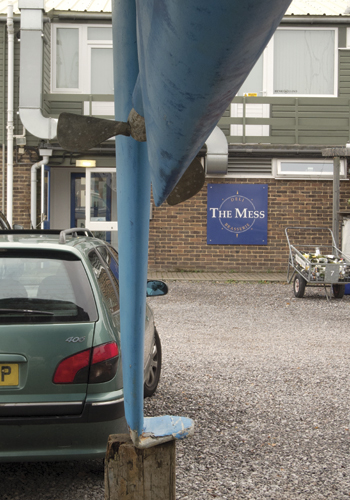 |
|
The pounding against the bottom bent the tip of Onora’s rudder. |
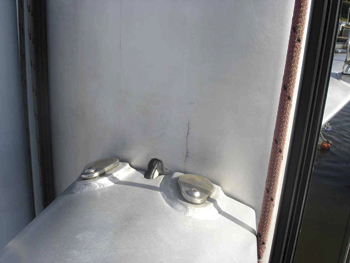 |
|
Cracks developed in the vessel’s mast. |
Now our engine seized. The jib sheet that had come loose in the mayhem had found our propeller. It did not take much sign language to convey this to our Polish crewmember who called Huragan to continue the tow into the harbor. He motioned to stay exactly behind his ship, which followed the uncharted deep channel that hugged the western breakwater.
Aftermath
Hindered by mangled thumbs and murky water, I needed full scuba gear and an hour of air to clear the prop and check the bottom. The forward foot of our keel was dented and the bottom 10 inches of the rudder, designed to be sacrificial, was bent 90 degrees. Otherwise, the rudder seemed true and the wheel turned without binding. The damage was not threatening and the boat was sea worthy, but I wondered about the crew.
After all was cleaned up we went to town buy Heineken and snacks for our Huragan heroes. We received a tour of the rescue station manned 24/7 with included closed-circuit television monitors watching the harbor’s mouth and fire station style living and bed rooms for an always-ready team.
That evening we went to a recommended restaurant. I needed to know Ian’s and Jeannie’s thoughts. Over pierogi and pilsner I opened the session.
“I feel responsible. I felt a small bump on the way in and should have realized the chart was inaccurate. With a six-foot swell running, the depth we left in was three feet less at the bottom of each trough than the flat water when we arrived. Without knowing where that channel was, we were doomed to go aground.”
Jeannie waited for Ian to respond. He spoke up, “After the lightning knocked out our instruments you could not know what the depth was. I feel guilty for pulling that line out that went overboard.”
Jeannie confessed, “I should not have panicked on the radio. Also, from now on we all wear life jackets when we leave the dock. One of us easily could have been injured and knocked overboard. In the mayhem it was too dangerous to go to the life jacket locker.”
I raised the option of staying in Leba for a few days. A car could be rented to explore the area winding up in Gdańsk for a day before Ian’s plane. We could let our nerves recover before heading back to sea.
The crew would have none of that. The breeze was down and now we knew the channel to get back to the sea.
We left without incident the next morning under a warm sun and had a fine run to Gdańsk with the sails billowed out on twin poles.
————
Jim and Jean Foley live aboard their aluminum sloop Onora.

